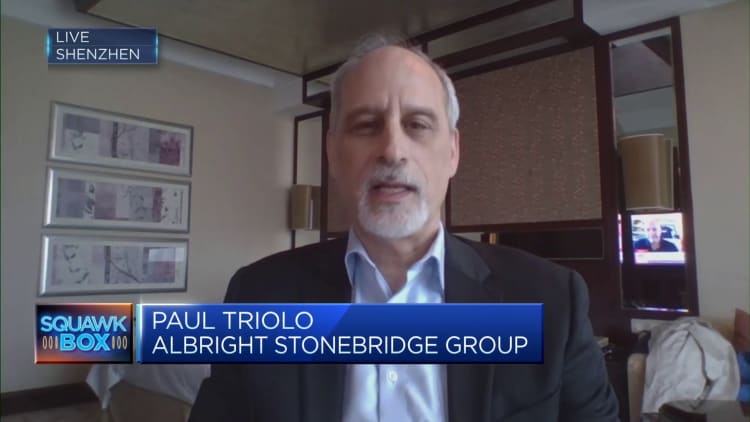
The flags of China and the USA are being displayed on a smartphone, with an NVIDIA chip visible in the background.
Raa | Nurphoto | Getty Images
Chinese companies are ramping up efforts to produce a viable alternative to Nvidia’s chips that power artificial intelligence as Beijing continues its efforts to wean itself off American technology.
U.S. sanctions slapped on China over the past few years, along with Nvidia‘s dominance in the space, have provided big challenges for Bejing’s efforts, at least in the short term, analysts told CNBC.
Nvidia’s well-documented boom has been driven by large cloud computing players buying its server products which contain its graphics processing units, or GPUs. These chips are enabling companies, such as ChatGPT maker OpenAI, to train their huge AI models on massive amounts of data.
These AI models are fundamental to applications like chatbots and other emerging AI applications.
The U.S. government has restricted the export of Nvidia’s most advanced chips to China since 2022, with restrictions tightening last year.
Such semiconductors are key to China’s ambitions to become a leading AI player.
CNBC spoke to analysts who identified some of China’s leading contenders that are looking to challenge Nvidia, including technology giants Huawei, Alibaba and Baidu and startups such as Biren Technology and Enflame.
The overarching view is that they are lagging behind Nvidia at this point.
“These companies have made notable progress in developing AI chips tailored to specific applications (ASICs),” Wei Sun, a senior analyst at Counterpoint Research, told CNBC.
“However, competing with Nvidia still presents substantial challenges in technological gaps, especially in general-purpose GPU. Matching Nvidia in short-term is unlikely.”
China’s key challenges
Chinese firms have a “lack of technology expertise”, according to Sun, highlighting one of the challenges.
However, it’s the U.S. sanctions and their knock-on effects that pose the biggest roadblocks to China’s ambitions.
Some of China’s leading Nvidia challengers have been placed on the U.S. Entity List, a blacklist which restricts their access to American technology. Meanwhile, a number of U.S. curbs have restricted key AI-related semiconductors and machinery from being exported to China.
China’s GPU players all design chips and rely on a manufacturing company to produce their chips. For a while, this would have been Taiwan Semiconductor Manufacturing Co., or TSMC. But U.S. restrictions mean many of these firms cannot access the chips made by TSMC.
They therefore have to turn to SMIC, China’s biggest chipmaker, whose technology remains generations behind TSMC. Part of the reason why it’s lagging behind, is because Washington has restricted SMIC’s access to a key piece of machinery from Dutch firm ASML, which is required to manufacture the most advance chips.
Meanwhile, Huawei has been pushing development of more advanced chips for its smartphones and AI chips, which is taking up capacity at SMIC, according to Paul Triolo, a partner at consulting firm Albright Stonebridge.
“The key bottleneck will be domestic foundry leader SMIC, which will have a complex problem of dividing limited resources for its advanced node production between Huawei, which is taking up the lion’s share currently, the GPU startups, and many other Chinese design firms which have been or may be cutoff from using global foundry leader TSMC to manufacture their advanced designs,” Triolo told CNBC.
Nvidia is more than just GPUs
Nvidia has found success due to its advanced semiconductors, but also with its CUDA software platform that allows developers to create applications to run on the U.S. chipmaker’s hardware. This has led to the development of a so-called ecosystem around Nvidia’s products that others might find hard to replicate.
“This is the key, it is not just about the hardware, but about the overall ecosystem, tools for developers, and the ability to continue to evolve this ecosystem going forward as the technology advances,” Triolo said.
Huawei leading the pack
Triolo identified Huawei as one of the leaders in China with its Ascend series of data center processors.
The firm’s current generation of chip is called the Ascend 910B, and the company is gearing up to launch the Ascend 910C, which could be on par with Nvidia’s H100 product, according to a Wall Street Journal report in August.
In its annual report earlier this year, Nvidia explicitly identified Huawei, among other companies, as a competitor in areas such as chips, software for AI and networking products.

In the area of software and building a developer community, Huawei “holds lots of advantages,” Triolo said. But it faces similar challenges to the rest of the industry in trying to compete with Nvidia.
“The GPU software support ecosystem is much more entrenched around Nvidia and to a lesser degree AMD, and Huawei faces major challenges, both in producing sufficient quantities of advanced GPUs such as part of the Ascend 910C, and continuing to innovate and improve the performance of the hardware, given U.S. export controls that are limiting the ability of SMIC to produce advanced semiconductors,” Triolo said.
Chip IPOs ahead?
The challenges facing China’s Nvidia competitors have been evident over the past two years. In 2022, Biren Technology carried out a round of layoffs, followed by Moore Threads the year after, with both companies blaming U.S. sanctions.
But startups are still holding out hope, looking to raise money to fund their goals. Bloomberg reported last week that Enflame and Biren are both looking to go public to raise money.
“Biren and the other GPU startups are staffed with experienced industry personnel from Nvidia, AMD, and other leading western semiconductor companies, but they have the additional challenge of lacking the financial depth that Huawei has,” Triolo said.
“Hence both Biren and Enflame are seeking IPOs in Hong Kong, to raise funding for additional hiring and expansion.”






